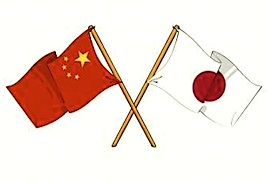 By Alex Salomon
By Alex Salomon
As a quick but obvious disclosure, I am far from knowing much, or anything, about China and Japan. Having traveled there and read a couple of books on Chinese geopolitics and rise to power of Maoism doesn’t qualify. Let’s face it: I know far more about “Calvin & Hobbes” than about “China & Japan.” With this disclosure in place, I still wanted to cast a quick review of maelstrom going on between China and Japan, supposedly over tiny little islands (the Senkaku archipel… do we even know if they are inhabited?).
What is really going on is a massive, generationally important alignment of China, Japan, the United States, Indonesia, South Korea and other rising Asian economies and the game of alliances in that region.
On the surface, we are only seeing protests and demonstrations. Under the hood, we are seeing the chess game played between Japan and the USA to maintain strong power and maybe even leadership in Asia, over China.
The conflict over these islands (and their oil reserves) is just a front, a pretext, especially when one considers that Chinese citizens barely have the freedom to sneeze, let alone to march in the streets — unless it is fully authorized and planned by the State. Likewise, just considering that China is Japan’s #1 commercial partner and Japan is China’s #2 (or #3 if we account for the EU as a single country), it takes a considerable amount of centralized Politburo influence to accept violence against assets of such an important partner. Just think about it: in a non-democratic state that does not recognize the basic right of demonstration to its citizens, how can we have massive riots against the said-State’s #2 single-country partner?
On the other hand, it has been clear for a while that Japan has been worried, tormented even, by the meteoric rise of its neighbor and the change in the world’s ranking of largest economies. In this economic war, the United States has aligned with Japan in creating a firewall against China’s hegemonic views on the region. As a matter of fact, President Obama’s administration has consciously, carefully planned for a slow but inalterable shift of the USA’s main alliance, away from Europe and the Middle-East, towards Asia, Japan, South Korea, Indonesia… and China.
With these disclosures in place, consider these facts when you hear or read about the ongoing feud:
- Considering the upcoming Politburo elections, how much of the riots only serve as a Nationalistic agenda for the candidates?
- How much of the riots are just to help some of the new upcoming leaders with ultra simplistic populist rhetoric?
- At any point, ask yourself: if citizens don’t have the right to manifest for food, freedom of expression or political view, how can they be in the streets against Japan? Why?
- Can it be that the feud is the tip of the iceberg, and the unseen part the ongoing, always stronger economic war between China & Japan/USA?
- Does decrying Japan as a colonialist and aggressive power serve a Chinese agenda to gain traction with Indonesia, Thailand, S. Korea?
- How much of the message “we are not afraid of Japan (and the USA)” is really meant as “then just imagine how little we are afraid of re-taking Taiwan”? Even if only to serve populist fevers?
- We have Freedom of Speech… Chinese don’t. Everything can be fabricated, used, manipulated? Thousands of boats going to Senkaku could be photoshopped.
- What is the US agenda in the region? Hint? It’s HUGE!
- Conspiracy theorists and QE theorists, have fun with this one: isn’t destroying assets, to rebuild them, just a form of easing / interventionism?
- Lastly, how much of what is reported back here just used and manipulated for our own Presidential campaign?
Things are rarely what they seem. In geopolitics just like in finance, if everybody sees the same trade, it usually is the wrong one.
—————————————————————-
Twitter: @alex__salomon @seeitmarket Facebook: See It Market
Any opinions expressed herein are solely those of the author and do not in any way represent the views or opinions of any other person or entity.







